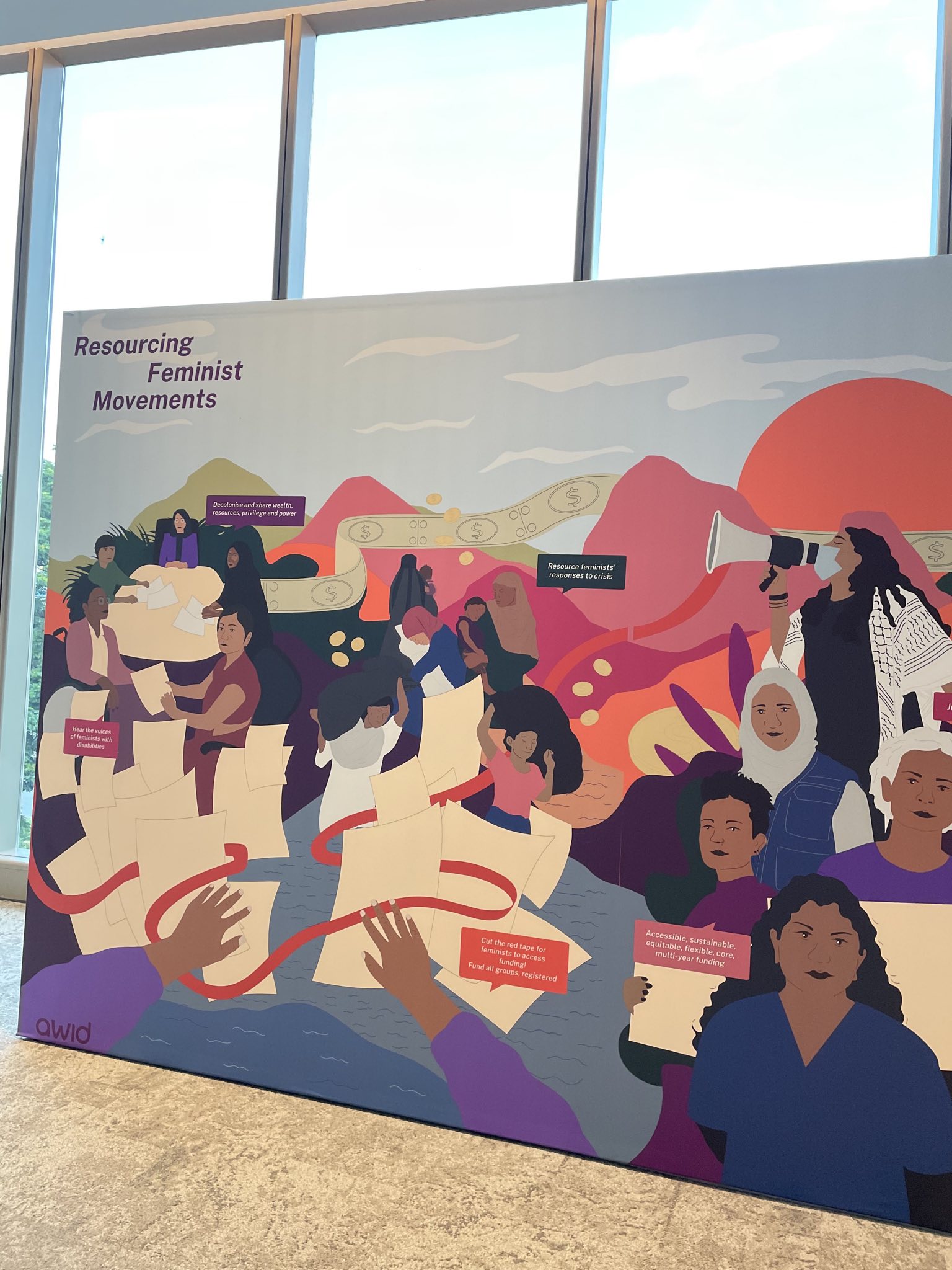
Whose internets? Our internets! Weaving Liberation at the AWID Forum
Going to international civil society gatherings is always a humbling experience as a European civil society organisation. The AWID Forum 2024 was no exception – it even more so underlined the power of feminist movements from the Global Majority and the timid place European initiatives play in those many beautiful currents fighting for a world in which gender assignation doesn´t determine one´s access to resources and longevity of life.
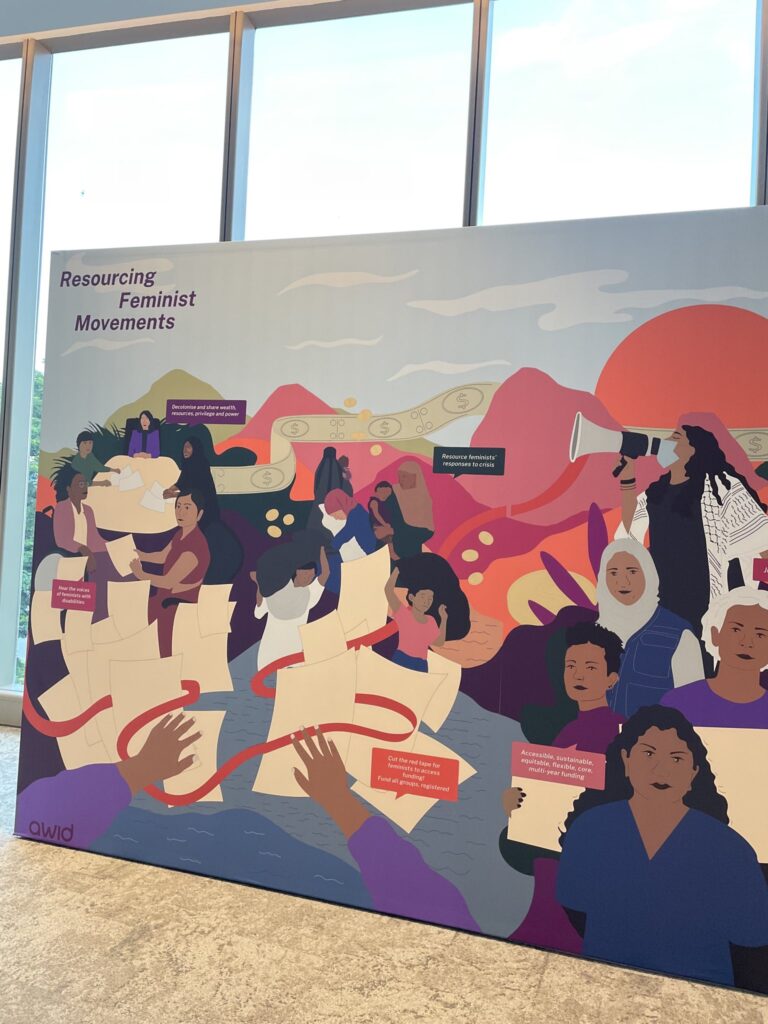
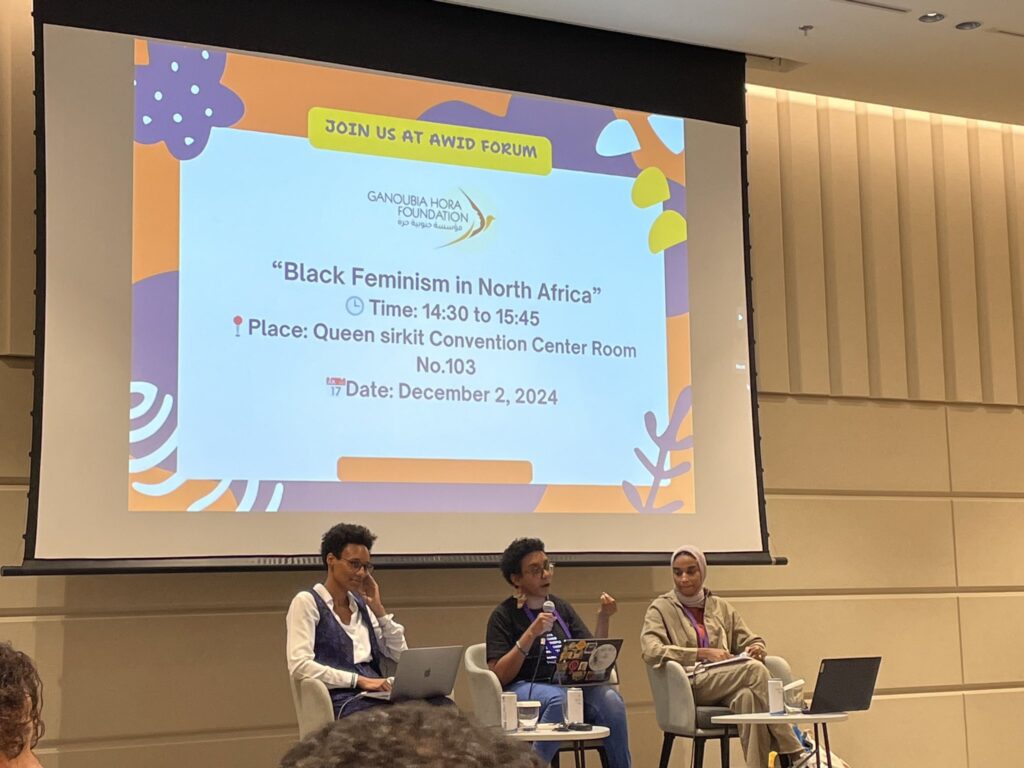
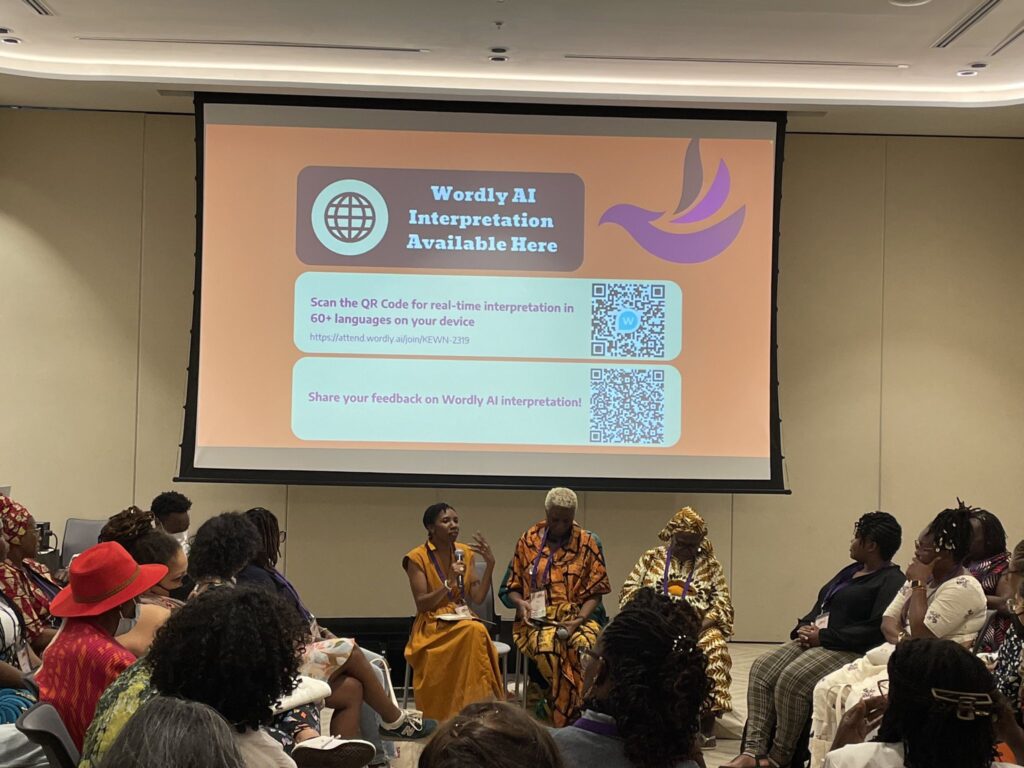
During the four days of the 15th AWID international Forum, organised under the motto “Rising Together” reaffirming that no question of justice is foreign to the feminist struggle, workshops tackled themes of land sovereignty, bodily autonomy, wars and conflicts, sex work, migration, self-determination, healing justice… and, of course, tech.
The Feminist Tech Gardens
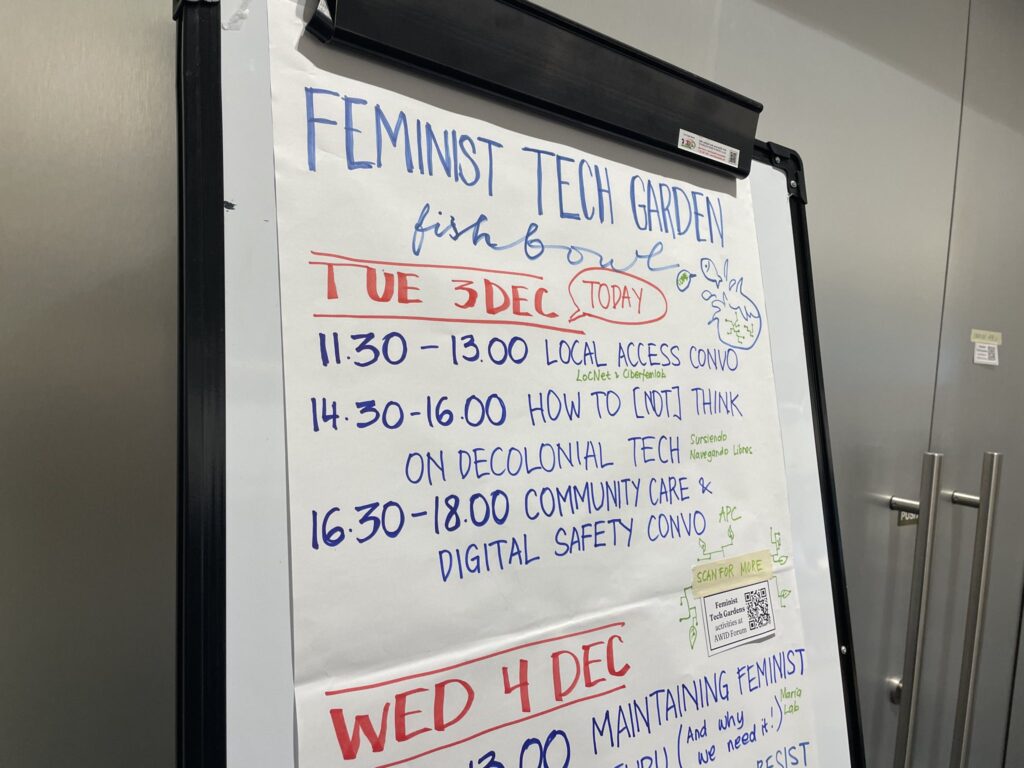
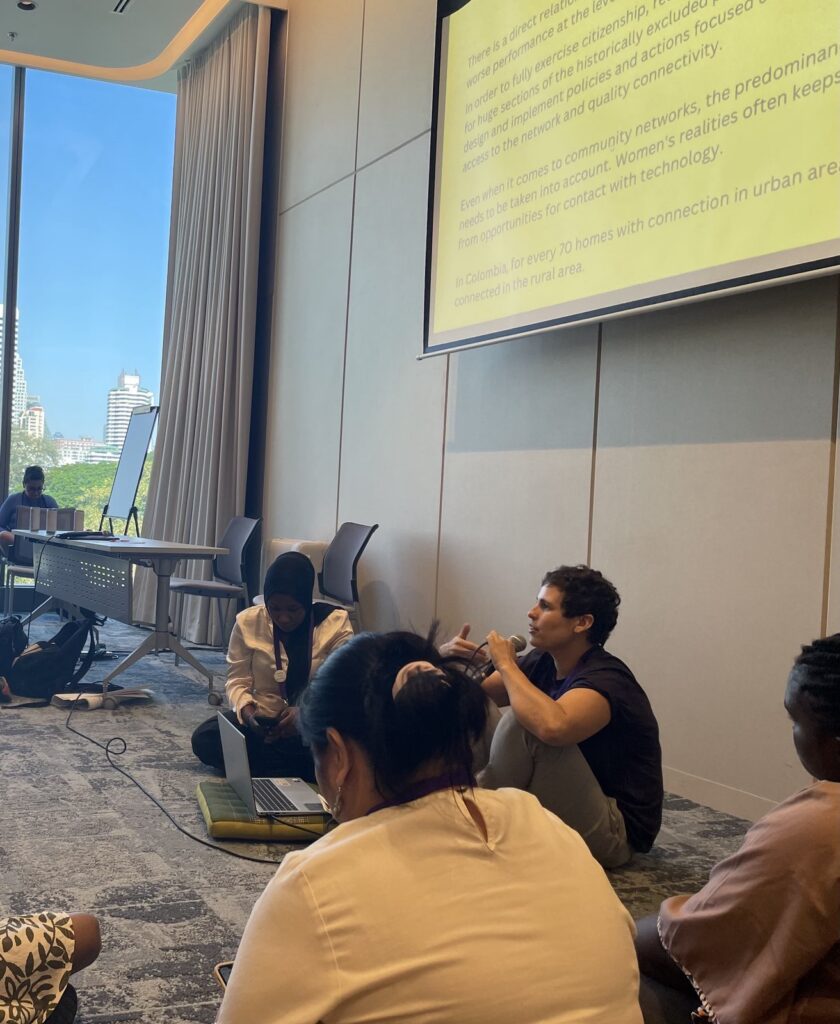
For the first time, two spaces were solely dedicated to feminist tech, organised together by Numun Fund, Whose Knowledge? and the Association for Progressive Communications (APC). The Feminist Tech gardens, self-described as “interconnected ecosystems to collectively nurture and reclaim the digital and technological space with solidarity, hope and resistance” offered digital safety support, psychological and digital aid, media clinics, a space for workshops called the “fishbowl” and a permanent exhibition/meeting space. During those days, organisers from the Global Majority deployed visions and curiosity, investigating ways towards feminist understanding of technologies – exploring questions of tech-education and community-empowerment, infrastructures and maintenance, as well as collective decision-making paradigms. The spaces displayed the abundance of work and solutions that have been put in place in different regions to build community-centred connectivity and challenge patriarchal structures of technology-making. One of the transversal points that one could hear in the different discussions is a shared understanding of feminist tech as the use of technologies to support feminist movements, rather than specific types of applications relating to specific topics.
There is no feminist tech without sex workers
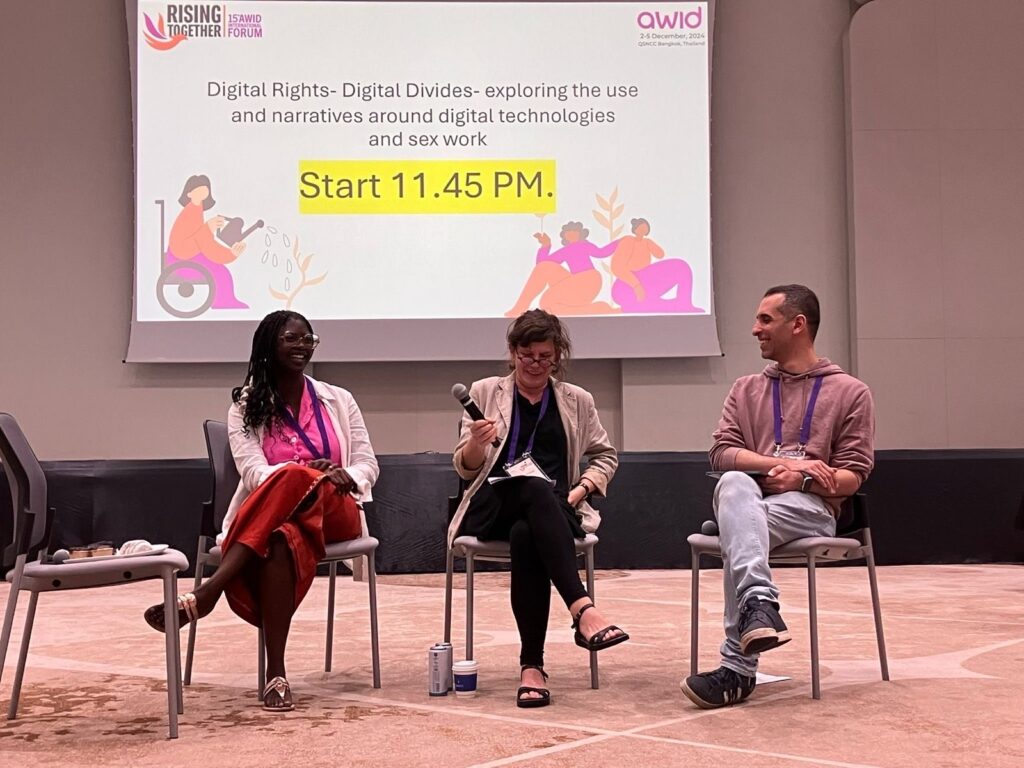
Weaving Liberation took part in the panel Digital rights/ digital divides : exploring the use and narratives around digital technologies and sex work, invited by the European Sex Workers’ Rights Alliance (ESWA) and with the Sex Workers Rights Advocacy Network (SWANN).
In the process report from the South Feminist Manifesto, which was presented during the forum, one of the participants to the Arabic Language group, convened by Mena Souilem and Maie Panaga, is quoted saying :
“We exist between the polarisations of technophilia and technophobia. Tech is a tool a lot of us in the region have used to learn and educate ourselves… But it’s also a big threat to us as activists and active collectives in the region. It’s as much of a survival and knowledge tool as it is of oppression and surveillance.”
These words, which bear a specific meaning concerning the Southwest Asia and North Africa region, nonetheless resonate with what was discussed during the panel.
There is no internet as we know it without sex workers. “Sex workers created the internet.” This is a quote from Kristen Diangelo co-founder and executive director of the Sex Worker Outreach Project (SWOP) Sacramento chapter. This expression doesn´t mean to erase the labour of people whose sweat in mines in Chile or Congo literally build the internet, but rather to complexify our understanding of who is at the inception and key to the design of the internet as we know it today. Far from the story of some lovely nerds in a garage in California that had nothing but some wild dreams and the courage to do it – the internet was imagined collectively, from different angles and geographies, with multiple voices coming in. One of those key voices were sex workers, who were the first to invest in online spaces to create content to promote themselves, have individual websites, stream content – which led to higher resolution camera and a need for more bandwidth – to need online payment systems – which have now become our day-to-day life – to see the commercial potential of the internet from the early start. Sex workers were also pioneers in looking for their community online, create fora etc. There is a beautiful website called “Sex workers built the internet” which details this with much more expertise.
So, there is no internet as we know it today without sex workers. There is also no feminist tech – the act of imagining, building and deploying technologies based on feminist principles- without sex workers.
Feminist tech is sex workers’ rights is migration justice because it demands of us to think of technology outside of carceral logics and criminalisation and beyond borders. In ESWA´s newest report “Exposed from all sides: The role of policing in sex workers´ access to justice” the research finds that “regardless of the legal framework in which they operate, sex workers across Europe are targeted with intense policing and subjected to systematic control and profiling by the police”. The policing is heightened by digital forms of policing as highlighted during the conversation by Yigit Aydınalp from ESWA, including via looking at Google translates search to establish if the person stopped was doing sex work, the risks with CCTV cameras and potential use of facial recognition technologies when doing street work, and digital borders control and concerns around privacy and safety, when traveling while being flagged in one State as a sex worker. Understanding sex work as a feminist tech issue demands of us to think about health issues and reproductive justice issues, surveillance, finance and intimacy. About autonomy and self-determination. And about race, because the majority of sex workers are racialised, because race is a sexual and sexualised notion that is central to understanding the history of sex work since the Atlantic slave trade – because some of us are identified as sex workers, whether we do sex work or not. Because sex workers of Colour, especially Black sex workers and especially Black transgender sex workers, have higher chances of dying of a violent death. In the discussion, Stasa from SWANN underlined how the digital divide specifically impacts Roma sex workers in Macedonia due to the websites being either in English or Macedonian and not in Arli, Džambaz or Burgudži. Therefore, feminist tech is sex workers’ rights is racial justice. Feminist tech is sex workers’ rights is disability justice because the criminalisation narrative around sex work is profoundly ableist – “they are not able to know what is best for themselves” but also, more importantly, because sex work is often care work. The conditions to perform this care work are highly dependent on other factors. As Stasa Plecas from SWANN, explained during our conversation- and in line with the report “Sex Work and Digital Technologies in CEECA”
Many sex workers find it difficult to obtain essential digital tools like smartphones or computers, a struggle amplified by economic constraints, legal barriers, and pervasive societal stigma. For example, sex worker organisations in Ukraine and Kyrgyzstan reported that numerous sex workers lack access to smartphones and the internet. Disparities in internet access persist within the CEECA region, with rural areas and marginalised and poor communities bearing the brunt of limited or unreliable connectivity. This digital isolation significantly impairs sex workers’ ability to connect with clients, access online resources, advertise their services, and actively engage in advocacy efforts aimed at improving their rights and safety.
And of course, feminist tech is sex workers’ rights, and it is queer liberation, because sex workers have been at the forefront of challenging gender binaries and cis-heteronormativity. Marsha P. Johnson, Silvia Riviera, who started the Stonewall riots, where transgender women and also sex workers.
So there is no feminist tech outside of sex workers’ rights and there is no sex workers’ rights worth fighting for outside of queer, feminist, antiracist, anticarceral migrant and disability justice. Embracing this approach, Yigit Aydinalp, emphasized in the discussion, enables all of us to better protect our digital rights, as proven when looking at questions of online age verification or online banking systems in general.
Building feminist movements amid an increasingly bordered world
While so many movements came, many people, disproportionately from the African continent (Sudan, Congo among others), Haiti and Palestine were not able to, linked to visas being denied, not having even a place to ask for a visa, not enough time given to appeal rejection decisions, etc. Visa politics keep on preventing us from building worlds in which women and gender-expansive people’s rights are human rights and human rights are for everyone. This fact asks of us to build better infrastructures of solidarity, to be true to our promises. It again highlights that the “border line” is the biggest issue of our time, preventing us to engage with any topic fully or truly until we address this one.
